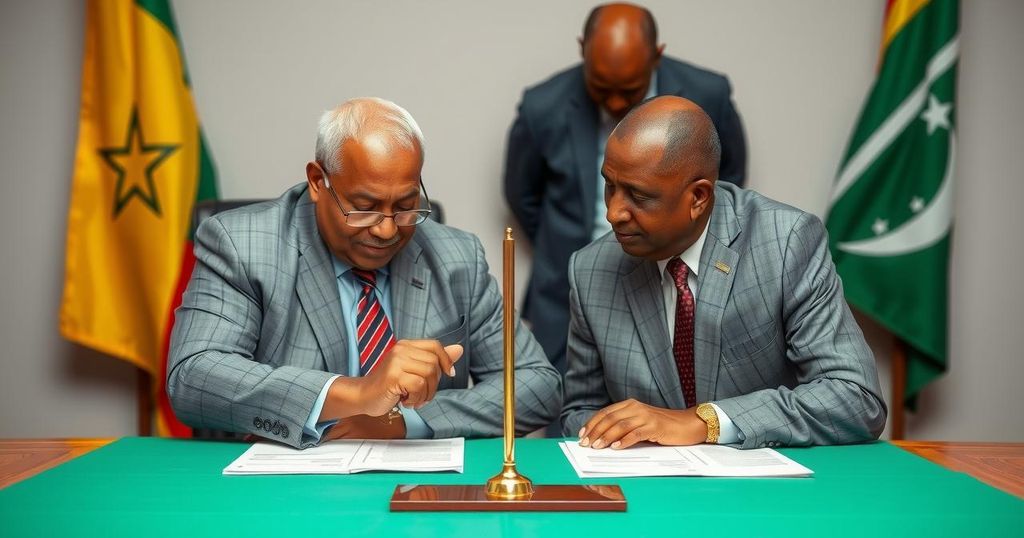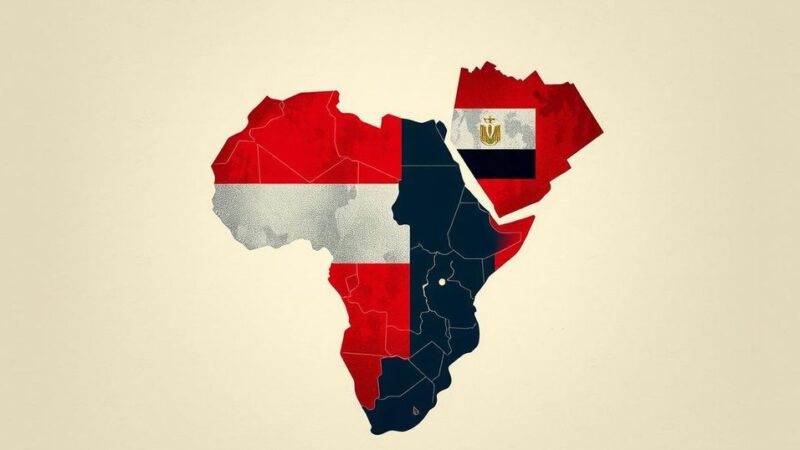Turkey mediated a reconciliation agreement between Ethiopia and Somalia on December 11, 2024, aimed at fostering cooperation after escalating tensions linked to Ethiopia’s agreement with Somaliland. This historic accord has garnered international support and underscores Turkey’s growing diplomatic role in the Horn of Africa. Both nations committed to mutual respect and economic collaboration, although challenges remain due to internal dissent and Somaliland’s pursuit of recognition.
On December 11, 2024, Turkey successfully mediated a pivotal reconciliation agreement between Ethiopia and Somalia. This diplomatic breakthrough, achieved in Ankara, signifies Turkey’s increasing influence in the Horn of Africa. The pact enables both nations to pursue renewed cooperation following a year marked by rising tensions. Notably, the United Nations, the United States, and the African Union expressed their support for this agreement.
The origins of the conflict between Ethiopia and Somalia can be traced to January 2024, when Ethiopia entered into a contentious Memorandum of Understanding with Somaliland, a self-declared autonomous region within Somalia. This agreement allowed Ethiopia to establish a naval presence along a strategic section of the Somaliland coastline, leading to fears in Somalia about potential recognition of Somaliland’s independence. This event soured bilateral relations significantly.
The ensuing diplomatic crisis polarized alliances within the region, with Somalia receiving military support from Egypt, Eritrea, and Djibouti. Conversely, Ethiopia garnered backing from Uganda and Kenya. The tensions intensified with Somalia’s demand for the withdrawal of Ethiopian troops from its territory by the close of 2024, which was crucially intertwined with the expiration of the African Union Transition Mission’s mandate.
In this context, Turkey emerged as a mediator through the ‘Ankara Process’, which commenced on July 1, 2024. This initiative involved high-level discussions between officials from both nations and included further talks held during the UN General Assembly in September. The culmination of these diplomatic efforts led to the agreement on December 11, 2024.
The Ankara Declaration expresses both nations’ commitment to sovereignty, unity, and mutual respect, paving the way for a collaborative approach towards shared economic benefits. Somalia acknowledged Ethiopia’s contributions to African Union missions and assured Ethiopia of access to the sea, while both countries promised to formalize bilateral agreements over commerce by mid-2025.
For Ethiopia, the agreement is an essential step towards achieving access to maritime resources, which remains crucial for its economic recovery following years of conflict, including the Tigray war. This situation poses a critical juncture for Prime Minister Abiy Ahmed, whose strategies seek to foster economic rejuvenation while avoiding exacerbation of the existing social tensions.
In contrast, Somalia could leverage this accord to stabilize its security landscape, particularly against threats posed by Al Shabaab. However, internal resistance may arise from nationalist factions opposed to perceived compromises in national sovereignty. Nonetheless, Somalia’s leadership will need to navigate these domestic challenges adeptly to gain public support for the benefits the agreement could yield.
Moreover, Somaliland’s aspirations for international recognition add another layer of complexity to the reconciliation process. The emergence of a newfound partnership with Ethiopia under President Abdirahman raises concerns for Somalia, especially with the potential for US recognition of Somaliland complicating its territorial claims.
Xavier Macron’s recent diplomatic overtures highlight France’s desire to support Ethiopia’s quest for naval capacity without infringing on neighboring nations’ territories, despite earlier setbacks in cooperation. France’s cultural investments in Ethiopia epitomize broader efforts to reclaim influence lost in other regions of Africa.
Ultimately, Turkey’s role as a mediator strengthens its standing as a diplomatic pillar in the region, though the success of the agreement hinges on the collaborative commitment of all involved parties. Ethiopia must manage its ties with Somalia carefully to prevent rekindling tensions, while Somalia’s government must effectively engage nationalist factions with a focus on the agreement’s potential advantages.
The Ankara Declaration marks a noteworthy milestone in peace efforts, underscoring Turkey’s growing diplomatic presence and the precarious dynamics at play in the Horn of Africa.
The Ethiopia-Somalia conflict is deeply rooted in historical disputes regarding territorial integrity and recognition, exacerbated by Ethiopia’s 2024 agreement with Somaliland. The geopolitical landscape further complicated relations, drawing in regional powers that supported opposing sides amid a tense military standoff. Turkey’s mediation through the ‘Ankara Process’ underscores a strategic diplomatic engagement that seeks to address these long-standing tensions, reflecting broader trends in international relations in the Horn of Africa and Turkey’s expanding influence in the region.
The agreement facilitated by Turkey represents a significant diplomatic achievement that fosters dialogue in one of the world’s most tense regions. As Ethiopia and Somalia move towards greater cooperation, the outcome will depend on the effective management of internal dissent and sustained commitment from both parties to honor their commitments under the Ankara Declaration. The involvement of international actors such as the US and France will also play a critical role in stabilizing the region and enhancing Ethiopia’s maritime ambitions.
Original Source: www.idsa.in







